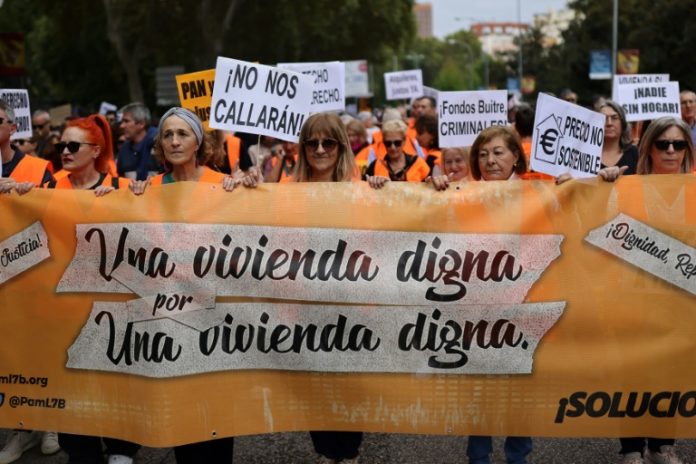Socialist Prime Minister Pedro Sanchez is under increasing pressure due to Spain’s severe housing crisis, as the government’s policies are ineffective and the country’s struggling citizens are becoming increasingly irate.
Juan Lozano, 24, told AFP, ‘Finding a place to rent has now become a minefield, especially for the young.’.
‘The prices are extremely high when there is supply, and there is very little of it.’.
Lozano was one of about 22,000 demonstrators who flocked to central Madrid on Sunday to express their ire over skyrocketing prices, the lack of available new housing, and the threat of a rent strike against landlords.
For Spain, which is still scarred from the 2008 real estate market crash that coincided with the global recession, housing has been an intractable problem for successive governments.
However, Lozano stated that the crisis is now ‘unsustainable ‘ in light of the Covid-19 pandemic.
Idealista, an online property platform, reports that over the last ten years, the cost of renting a square meter has increased by 82%.
Low-income households found it impossible to find a home mission because that increase easily outpaced average wages, which only increased by 17% during that period, according to Spain’s national statistics institute.
The lack of social housing, which accounts for only 2. 5% of the total stock compared to the EU average of 9. 3%, exacerbates the issue.
– Housing becoming a ‘fantasy’ -.
As tensions simmer with left-wing allies in parliament and frustrated citizens grow more impatient, the crisis has plagued Sanchez’s precarious minority government, which takes pride in standing up for the working class.
According to the National Tenants’ Union, ‘Rents are suffocating us and no one does anything.’.
‘While a minority becomes wealthy at the expense of their labor, the majority of society has been bearing the burden of the housing crisis for far too long.’.
A ‘fantasy for large parts of society ‘ is housing access, according to trade union CCOO, which urged the state to include the right to ‘a decent and suitable home ‘ in the constitution.
In May of last year, the government unveiled a historic law that would increase social housing, cap rents in regions where the market is most constrained, and penalize property owners who fail to occupy their homes.
However, the law hasn’t been able to stop the soaring rent increases, which between July and September increased by 10. 2% annually, reaching a peak of 15% in major cities like Madrid and Valencia.
Although less than 100,000 new homes are estimated to be built annually, the Bank of Spain projects that 600,000 new homes will be needed by the end of 2025 to meet the needs of the population.
Additionally, Madrid and some regional governments in charge of enforcing the law are at odds over it.
– ‘Absolute priority’ -.
On Monday, Sanchez defended the record of his administration, claiming that since taking office in 2018, housing resources had increased eightfold.However, he acknowledged that ‘magic wands ‘ would not be able to solve the ‘difficult ‘ problem.
He declared that housing would be the ‘absolute priority ‘ of his administration and that he wished to prevent ‘a Spain with wealthy owners and poor tenants.’ He also announced a 200 million euro ($218 million) youth housing program.
The so-called ‘golden visas, ‘ which gave residence permits to foreigners who invested in real estate and were accused by critics of promoting speculation in large cities, were recently terminated by the government.
It has also pledged to speed up the building of new homes and curb the proliferation of tourist apartments, which lowers the quantity of homes on the market.
More needs to be done, as many Spaniards are tired of false dawns.
In an interview with AFP, Laura Barrio of the collective ‘Stop Desahucios ‘ (Stop Expulsions) said, ‘We have had promises for years ‘ but ‘few results.’.
She went on, ‘Structural reforms ‘ are required to address the issue ‘from the roots.’.
vab/imm/ds/rl.


